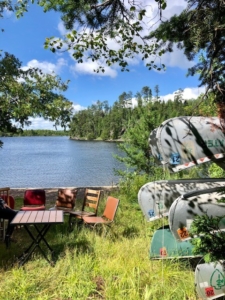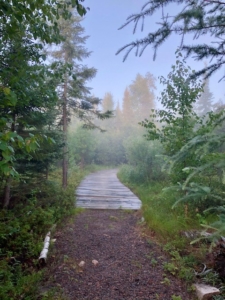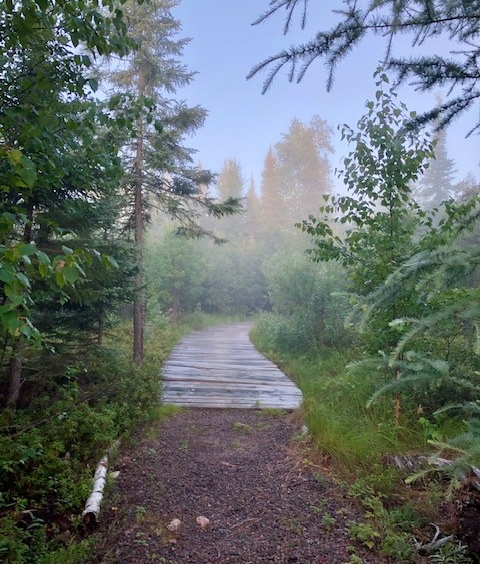Whispering Belovedness
For a long time, I have felt very hopeful during the days of Lent. Growing up, as I attended Wednesday night Lenten services, I would feel this twinge of joy and anticipation for Easter. But for most people sitting around me, the tone of Lent services always seemed so serious. The altar was draped in deep purple cloth, the hymns, anthems, and Kyrie were aggravatingly slow, incense was released in the sanctuary, and the congregation would leave in silence at the end. All of these thin gs inspired a somber mood, so as a young girl, I stifled my smile and followed along with the rest of the congregation, assuming that my deep feelings of hopefulness were somehow incorrect or inappropriate. But, as I’ve continued to live and to reflect, I’ve found that Lent is a deeply personal time. It is a season in which the blessing is setting aside purposeful time to spend with the Lord, and it can be a moment of joy; a deep internal joy that comes from knowing that at the end of these forty days comes the ultimate fulfillment of God’s promise.
gs inspired a somber mood, so as a young girl, I stifled my smile and followed along with the rest of the congregation, assuming that my deep feelings of hopefulness were somehow incorrect or inappropriate. But, as I’ve continued to live and to reflect, I’ve found that Lent is a deeply personal time. It is a season in which the blessing is setting aside purposeful time to spend with the Lord, and it can be a moment of joy; a deep internal joy that comes from knowing that at the end of these forty days comes the ultimate fulfillment of God’s promise.
Let’s talk about what Lent is. It starts on Ash Wednesday with a hefty confession of sin, an acknowledgement of human mortality, and a commitment to change. Then, in the weeks that follow, all are supposed to be deeply aware of their sin and the price Jesus had to pay for their humanness. These forty days of reflection and repentance “in the wilderness” are a tall order. So, you know… get busy.
Lent follows after Jesus’ forty days spent in the wilderness fasting, resisting temptation, praying, and waiting for Good Friday (Luke 4). But when people discuss Lent, I typically don’t hear them focus on Jesus’ baptism, which occurs directly before he enters into the wilderness. Jesus’ baptism is important context to my experience of Lent. Jesus spent so much of his life teaching, giving, and imparting, but in this moment, he receives. His baptism is an acknowledgement of faith in a personal way, a symbolic renewal, a cleansing of sin, and a reminder that forgiveness is always possible. Luke 3: 21-22 says “Now when all the people were baptized, and when Jesus also had been baptized and was praying, the heaven was opened, and the Holy Spirit descended upon him in bodily form like a dove. And a voice came from heaven, ‘You are my son the Beloved; with you I am well pleased.’” Jesus enters the wilderness, a landscape with no community, no food, and no familiarity, with the water of the Jordan still on him and a whisper in his ear calling his name: Beloved. I imagine it is the phrase that Jesus clung to in the coming days. In the middle of Lent, I want to remind you of this whisper.
Whenever I hear Lent referred to as “walking in the wilderness,” my ears perk up, as I’m sure some of yours do too. The idea of wilderness has a complicated biblical history. Words translated as “wilderness” occur about 300 times in the Bible. Biblical wildernesses are, variously: resource-less places, places of terrible danger, places of renewal, places of encounters with God, places of solitude and deep isolation, places of wandering, and places of intensity. Almost none of these translations equate perfectly with my own present-day understanding of the word, but in this case, I wanted to focus on the association of “wilderness” with “intense experience.” What intense experiences–positive or negative, serious or joyful, new or ongoing–are you walking through during this Lenten season?
As you continue to face whatever these forty days hold for you, cling to the knowledge that you, too, are called “Beloved.” Allow it to echo within your being. I leave you with a blessing written by Jan Richardson called “Beloved is Where We Begin.”
“If you would enter into the wilderness,
do not begin without a blessing.
Do not leave without hearing who you are:
Beloved,
named by the one who has traveled this path before you.
Do not go without letting it echo in your ears,
and if you find it is hard to let into your heart,
do not despair.
That is what this journey is for.
I cannot promise this blessing will free you from danger,
from fear or thirst,
from the scorching of sun
or the fall of night.
But I can tell you that on this path there will be help.
I can tell you that on this way there will be rest.
I can tell you that you will know the strange graces

that come to our aid only on a road such as this,
that fly to meet us bearing comfort and strength,
that come alongside us for no other cause
than to lean themselves toward our ear
and with their curious insistence whisper our name.
Beloved
Beloved
Beloved.”
-Jan Richardson from Circle of Grace
–Written by Lily Askegaard, WCB Program Staff 2020, WCB Chaplain 2021
